icecreamsandwich
Latest
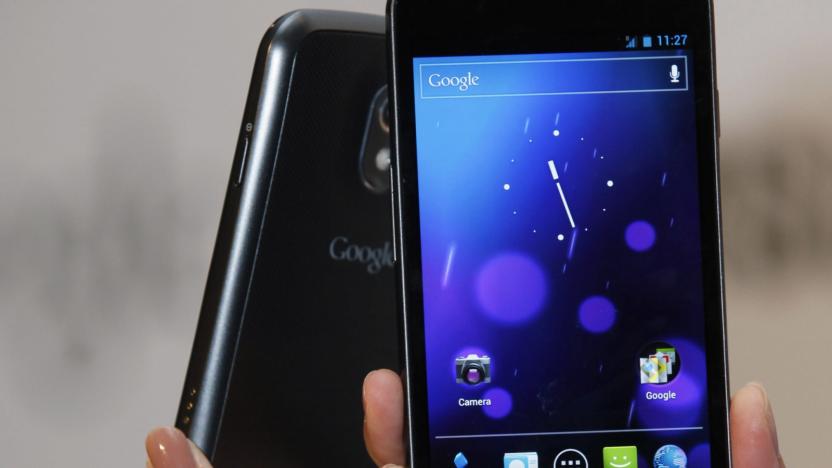
Google winds down support for Android 4.0 Ice Cream Sandwich
If you're still hanging on to a phone running Android 4.0 Ice Cream Sandwich, you might want to budget for an upgrade. Google has warned developers that it's deprecating support for Ice Cream Sandwich in upcoming versions of Play Services, the framework that gives Android apps and devices access to key features without requiring full-fledged operating system updates. Existing developer kit elements will continue to work, and individual components may continue to support the OS going forward, but "many" newer toolkit iterations will require at least Android 4.1 Jelly Bean.
Jon Fingas12.08.2018
Marshmallow is now on 10 percent of Android devices
The latest version of Android just hit a big, big milestone. Google's early June developer stats have revealed that Marshmallow is now on just over 10 percent of Android devices, representing a huge jump from just 2.3 percent in March. Notably, only some of that surge can be credited to people upgrading from Lollipop. While the not-quite-current version's adoption did go down (to 35.4 percent), the biggest declines in usage were for Jelly Bean and KitKat. In essence: many of those moving to Marshmallow may well have been replacing devices that were 3 or more years old.
Jon Fingas06.07.2016
Lollipop becomes the most popular version of Android
At last, there's a new flavor of Android on top of the heap. Google has published updated stats which show that Lollipop is now the most-used version of Android, snagging 36.1 percent of device share in early March versus former champ KitKat's 34.3 percent. It's a big milestone that suggests many Android users are using a reasonably modern take on the mobile platform.
Jon Fingas03.08.2016
Nearly a quarter of Android users are running Lollipop
Android Lollipop is enjoying its last, shining moment in the sun before Marshmallow arrives in earnest. Google's not-quite-current operating system now accounts for 23.5 percent of active Android users, a healthy 2.5-point boost from what you saw just one month ago. That's still trailing behind Jelly Bean (30.2 percent) and KitKat (38.9 percent), but it's clear that all those new devices and upgrades are starting to add up. The real question is whether or not that momentum will last. Marshmallow is arriving relatively quickly, and shouldn't suffer from the early performance and battery life woes that kept some people from upgrading last year. If the newer release catches on quickly, Lollipop might not reach the lofty adoption rates of its predecessors.
Jon Fingas10.07.2015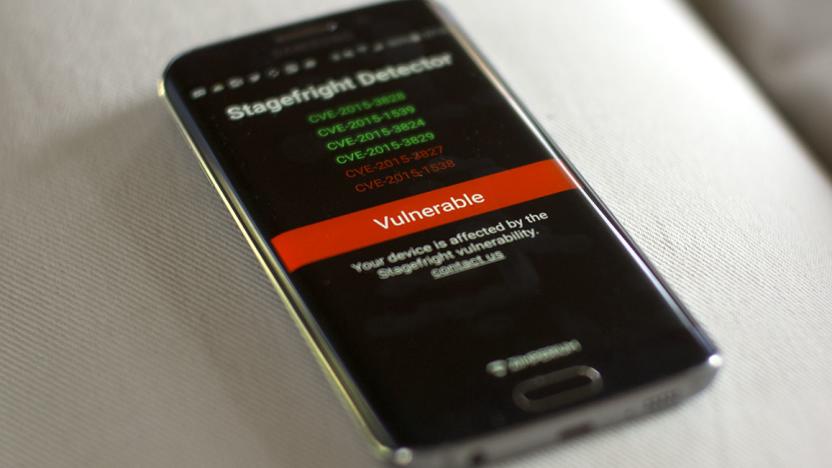
'Stagefright' vulnerability files released to the wild
On the heels of its Stagefright detection app, Zimperium (the outfit that discovered the Android security flaw) has released its exploit to the public. But before you get your hands dirty tinkering with it to find a fix there are a few things you need to consider. Zimperium says that it was tested on a Nexus device that was running Ice Cream Sandwich 4.0.4 and that "due to variances in heap layout" this exploit isn't entirely reliable. The Python script does work to take advantage of "one of the most critical" vulnerabilities the outfit discovered in the security flaw's library, however. Perhaps the biggest caveat, though, is that since the file was tested with Ice Cream Sandwich, Zimperium says that elements of Android 5.0 Lollipop, the fast-growing OS of choice for Android users, basically nullify its attempts to address the problem.
Timothy J. Seppala09.11.2015
Study says Android 4.0 and iOS 8 are most likely to crash your apps
Ever had the feeling that certain phone operating systems are more likely to crash your apps than others? It's not just you. Crittercism has posted its latest breakdown of crash reports from about 20,000 apps, and it's clear that certain operating systems aren't as friendly as others. On Android, Ice Cream Sandwich (4.0) is most likely to wreck your day; KitKat (4.4) is close behind, while Lollipop's early reputation for glitches apparently doesn't affect apps. With Apple devices, however, the tables turn. While iOS' app crash rate is lower overall, iOS 8 is a bit more problematic than its predecessor. That's not surprising given that Apple hasn't had as much time to tackle issues in 8, but you may feel better if you're still holding on to 7.
Jon Fingas02.14.2015
Android Lollipop is slowly (very slowly) hitting more devices
Lollipop didn't exactly take the Android world by storm when it first launched. Early adoption was slow enough that it made no real impact in usage share stats for the first couple of months. People are starting to take to Google's latest dessert-flavored OS, however -- it's finally on the official radar. Google's data now shows that about 1.6 percent of active Android users were using Lollipop as of the start of February. That's certainly not a lot, but it's clear that all those Nexuses and early Lollipop upgrades (most notably from HTC, LG and Motorola) count for something.
Jon Fingas02.02.2015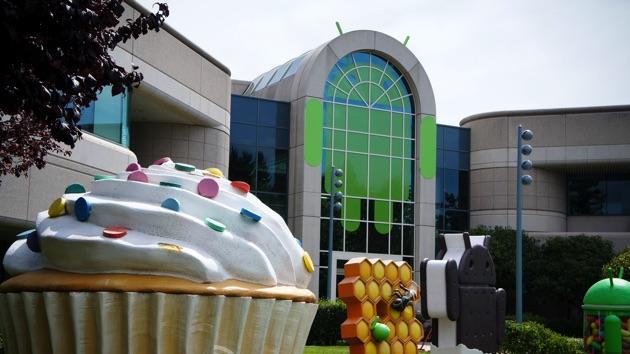
Google explains why it's not fixing web security in old Android phones
You might not be happy that Google isn't fixing a web security flaw in your older Android phone, but the search giant now says that it has some good reasons for holding off. As the company's Adrian Ludwig explains, it's no longer viable to "safely" patch vulnerable, pre-Android 4.4 versions of WebView (a framework that lets apps show websites without a separate browser) to prevent remote attacks. The sheer amount of necessary code changes would create legions of problems, he claims, especially since developers are introducing "thousands" of tweaks to the open source software every month.
Jon Fingas01.24.2015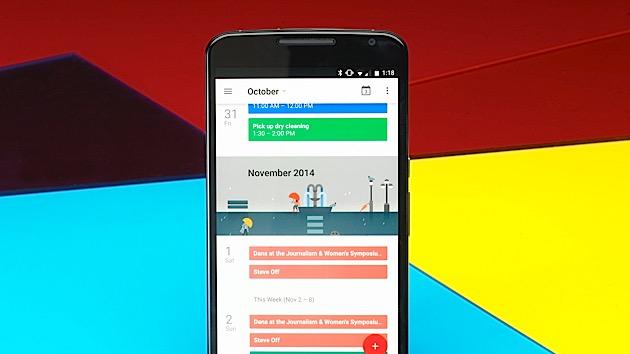
Lollipop isn't making a dent in Android usage numbers (yet)
Now that Android 5.0 Lollipop is finally rolling out to devices around the globe, you might be wondering just how much of an impact it's making on the Android ecosystem. The short answer: not much. Google has released its latest Android usage stats, and Lollipop doesn't even register yet -- in other words, less than 0.1 percent of Google Play users have moved to the new software. That's not surprising given that both the upgrade and Lollipop-native devices like the Nexus 6 are weeks old at best, but it suggests that the new OS will take a while before it makes its presence known.
Jon Fingas12.01.2014
Next year's Hondas will have Tegra and Android inside
Curious as to just which Honda models you'd see Android pop up in first? If you had money on the 2015 Civic, Civic Tourer and CRV it's time to collect your prize from the pool. Google's mobile OS will appear as standard equipment in those vehicles with a little help from Nvidia, naturally, and as the GPU giant tells it, Honda Connect will be the first infotainment system to run embedded Android on a Tegra chipset. Nvidia says that Connect will sport a 7-inch customizable touch-screen display that acts a lot like what you'd expect from a smartphone or a slate. Naturally that means there are swipe, pinch and zoom gestures along with an app store for the Ice Cream Sandwich-based system. How this will all play with Android Auto, though, remains to be seen.
Timothy J. Seppala10.01.2014
KitKat is now running on more than 20 percent of Android devices
In case there was any doubt that KitKat now has a solid foothold in the Android world, Google just offered some proof. Its usage data for early August shows that KitKat is on more than a fifth of active Android devices, at 20.9 percent. That's a healthy improvement over July (17.9 percent), and a big leap over the 14.9 percent we saw in June. The folks in Mountain View aren't explaining the steady growth, but it's easy to figure out what's going on -- big-name devices like the LG G3 and Samsung Galaxy Tab S are bringing this latest OS flavor to a wider audience, and many older gadgets are still getting upgrades.
Jon Fingas08.13.2014
KitKat is now on nearly 14 percent of Android devices
You know how Apple was keen to point out that only 9 percent of Android users (technically, 8.5 percent) were running KitKat in May? Well, that figure's now out of date. Google has published fresh usage stats which show that 13.6 percent of Android owners are using KitKat as of early June. That's still far from a majority, but it represents a 60 percent jump in a single month. It's not hard to see why the newer OS would be making such big strides. Major new phones like the HTC One and Galaxy S5 have had more time on the market, and KitKat upgrades are still making their way to older gadgets.
Jon Fingas06.05.2014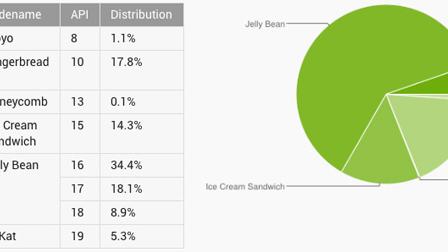
KitKat's share of Android devices more than doubles to 5.3 percent
After months of treading water, Android 4.4 KitKat is finally taking off. Google reports that 5.3 percent of Android users are running the newer OS version as of early April; that's more than twice the 2.5 percent that it claimed one month earlier. There's no official explanation for the jump, but it's most likely thanks to a wave of KitKat upgrades from HTC, LG and Samsung. Most older versions lost share as a result. It could be a long, long time before KitKat overtakes Jelly Bean (which dipped to 61.4 percent), but the transition is under way -- and it's only likely to accelerate now that flagships like the Galaxy S5 and new One are reaching store shelves.
Jon Fingas04.02.2014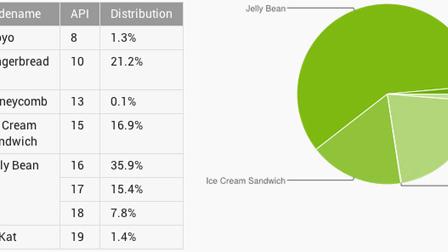
Jelly Bean claims 59.1 percent of Android device share as KitKat inches forward
Google has released its first Android device share data for 2014, and it's now clear that many users are flocking to a newer OS version... just not the latest version. While the shiny new KitKat release did climb to 1.4 percent of active devices in January, Jelly Bean was the real winner -- the older software jumped from 54.5 percent in December to 59.1 percent this month. There's no real mystery as to what happened, though. KitKat remains limited to mostly Google hardware, whether it's the Nexus line or Motorola phones; we haven't quite reached that point where large numbers of third-party devices either get KitKat upgrades or ship with the revision pre-installed. That surge may come soon, however, and the team in Mountain View can at least take comfort in knowing that over 60 percent of Android's active customer base is reasonably up to speed.
Jon Fingas01.11.2014
KitKat claims 1.1 percent of Android device share a month after launch
KitKat may be the new kid on the Android block, but it's already faring quite well. Google's latest OS dashboard reveals that 1.1 percent of active Android devices are running the new platform roughly a month after it became available. Not that its arrival is slowing down Jelly Bean's growth, mind you. The older software now represents 54.5 percent of all Android use, thanks in part to a two-point surge in devices running Android 4.3. However well Jelly Bean is doing, we expect KitKat adoption to rise quickly -- both the Nexus 5 and the first official KitKat upgrades have only been around for a few weeks at most, and there are more updates on the way.
Jon Fingas12.03.2013
Google Text-to-Speech hits the Play Store, brings charming British accent with it
Google is continuing its trend of pushing Android's built-in apps directly to the Play Store with Text-to-Voice. The application isn't very flashy on its own, but when coupled with Google Books it can read you a bedtime story or even integrate with Google Translate for aural pronunciation examples. Mountain View also added Korean language support, which could be useful if you ever want to ask a question while touring Samsung HQ. However, to use the app you have to be running Ice Cream Sandwich at the minimum -- you're still out there, right?
Timothy J. Seppala11.07.2013
More than half of Android devices now run Jelly Bean
It may have taken almost a year and a half, but Google can at last say that the absolute majority of active Android devices are using some form of Jelly Bean. The company's OS dashboard shows that 52.1 percent of owners are running at least Android 4.1; most of those (37.3 percent of the total) rely on the oldest version, but Android 4.2's use has already doubled since August. Jelly Bean's reign may be short-lived, however. The milestone comes just as Android 4.4 KitKat is reaching the public -- given Google's focus on supporting as many devices as possible with the new OS, it may not be long before Jelly Bean is once again in the minority.
Jon Fingas11.04.2013
BlackBerry begins BBM beta for Android (update: official comment)
Blackberry promised us back at BBLive that we'd see BBM on Android and iOS devices before the end of the summer. Well, we've hit the dog days of August, and while most of those devices are still BBM-free, it appears a select few Androids are finally getting to beta test the app. Blackberry OS reports that email invites are rolling out now to folks registered with BlackBerry's Beta Zone to test out BBM. Other than registration, users simply need a handset running Android 4.0 and up and they'll be messaging across the great platform divide in no time. We've reached out to the good people at BlackBerry for comment on the matter, and will update this post when we hear back. Update: We just got an official comment on the beta rollout, and it turns out the it had a limited number of slots, which have all been claimed: BlackBerry has begun internal testing of BBM on Android and iOS devices. We invited our employees to nominate friends and family to participate in a limited Android beta. Those slots are now full. For more information, please visit www.blackberry.com/bbm.
Michael Gorman08.01.2013
BlackBerry to offer BBM as standalone app for iOS and Android this summer
Thorsten Heins just broke what has to be the biggest news out of BBLive this morning: BBM is breaking out of its walled garden. Starting this summer, users running iOS 6 and Android ICS or higher will be able to download the BBM app for free and join in the messaging experience so highly curated by BlackBerry. Initially, however, only the messaging and group features will be accessible for outside users, but throughout the year, the company hopes to add BBM voice, BBM channels, screen sharing and video capabilities. You'll have to hold tight for a more specific launch date, as Heins didn't announce any concrete timing. But if you've waited for this news for years, what's a few more months?
Joseph Volpe05.14.2013
Android metrics show Jelly Bean adoption overtaking Ice Cream Sandwich
Google's big shake-up of Android version metrics has already given us a better understanding of where the platform's active users truly stand. Now that we're a month into the new methodology, we have a good sense of where those users are going -- and they're moving to Jelly Bean in droves. Android 4.1 and 4.2 combined grew to represent 28.4 percent of regular usage, or enough to finally overtake Ice Cream Sandwich at 27.5 percent. Not surprisingly, the transition to the newer OS involved a balanced mix of users either upgrading from ICS (down by 1.8 percent) or transitioning from devices running Gingerbread or earlier (down 1.7 percent). It will be a long while before Jelly Bean becomes the dominant platform, if it ever does, but we're not expecting a slowdown in adoption when flagships like the Galaxy S 4 and One are luring many of us into an upgrade.
Jon Fingas05.01.2013